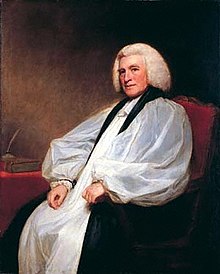Edmund Law
| Edmund Law | |
|---|---|
| Bishop of Carlisle | |

Edmund Law, by George Romney, 1781
|
|
| Church | Church of England |
| See | Carlisle |
| In office | 1768–1787 |
| Predecessor | Charles Lyttelton |
| Successor | John Douglas |
| Personal details | |
| Born |
6 June 1703 Cartmel, Lancashire |
| Died | 14 August 1787 (aged 84) Dalston, Cumbria |
Edmund Law (6 June 1703 – 14 August 1787) was a priest in the Church of England. He served as Master of Peterhouse, Cambridge, as Knightbridge Professor of Philosophy in the University of Cambridge from 1764 to 1769, and as bishop of Carlisle from 1768 to 1787.
Law was born in the parish of Cartmel, Grange-over-Sands, Lancashire on 6 June 1703. The bishop's father, Edmund Law, descended from a family of yeomen or statesmen, long settled at Askham in Westmoreland, was son of Edmund Law, of Carhullan and Measand (will dated 1689), by his wife Elizabeth Wright of Measand. The bishop's father was curate of Staveley-in-Cartmel, and master of a small school there from 1693 to 1742. He married at Kendal 29 November 1701 Patience Langbaine, of the parish of Kirkby-Kendal, who was buried in Cartmel Churchyard. He seems on his marriage to have settled on his wife's property at Buck Crag, about four miles from Staveley. There his only son, Edmund - the future bishop, was born. The boy, educated first at Cartmel school, and afterwards at the free grammar school at Kendal, went to St. John's College, Cambridge. He earned his B.A. in 1723. Soon elected fellow of Christ's College, he proceeded M.A. in 1727. He was always an earnest student. At Cambridge his chief friends were Daniel Waterland, master of Magdalene College, John Jortin, and John Taylor, the editor of Demosthenes. He was said to be a great personal influence on the intellectual development of Richard Watson, Bishop of Landaff.
...
Wikipedia
